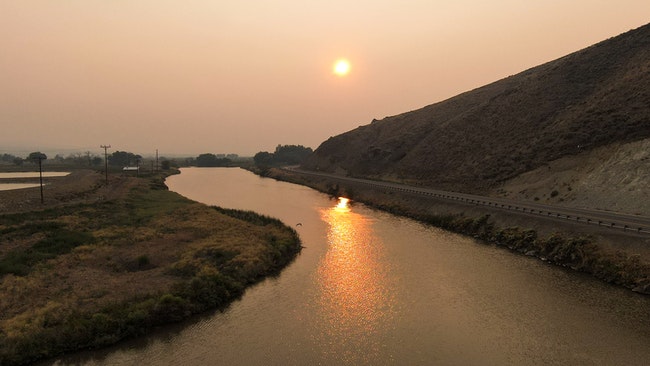
The sun reflects off the surface of the Malheur River on a smoky Friday, earlier this month. The Malheur County Court recently voiced opposition to a plan by two Oregon lawmakers to create new conservation restrictions on local streams and rivers. (The Enterprise/AUSTIN JOHNSON).
VALE – The Malheur County Court believes a plan by two Oregon senators to add safeguards to Oregon’s rivers and streams will damage the local economy, is too sweeping and doesn’t count the views of local officials.
The county commissioners declared their opposition recently to the River Democracy Act, sponsored by U.S. Sen. Jeff Merkley and U.S. Sen. Ron Wyden.
Wyden and Merkley, both Oregon Democrats, introduced the bill in February. The legislation aims to protect nearly 4,700 miles of rivers and streams in Oregon as part of the national Wild and Scenic Rivers System.
The added protections are designed to protect more state waterways, diminish wildfire risk, improve drinking water and expand recreation to boost rural economies.
The new act would guarantee that “only federal lands are affected by Wild and Scenic Designations, while protecting private property rights and water rights.”
One key change is to widen the area along protected waterways from one-quarter mile to a half mile.
Wyden kicked off a public process in late 2019 to gather recommendations from state residents on what river and streams needed protection.
“Since then, nearly 2,500 Oregonians submitted over 15,000 nominations. This bill is a product of the Oregon Way, with every Oregonian given the chance to nominate their favorite Oregon river or Stream,” according to the fact sheet from Wyden’s office.
Malheur County’s commissioners, though, worry about unintended consequences and federal overreach.
“I don’t think it is a benefit for the county and I think it just adds to the laws already on the books on managing specific areas,” said Commissioner Ron Jacobs.
The county resolution opposing the Senate legislation lists 32 area streams that could be impacted by the new legislation.
“The problem is about 90% of those are intermittent streams” that don’t flow all year, said Jacobs.
Jacobs said more studies are needed on such streams.
The county resolution identified 11 streams such as Rattlesnake Creek and Indian Creek that are “ephemeral or intermittent and dry up in the middle of summer and others can be stepped across without getting feet wet.”
“None of these proposed rivers and streams went through any screening or evaluation process required under the Wild and Scenic Rivers Act, rather this list was developed by senators surveying the public to nominate their favorite stream,” the county resolution said.
The legislation will require a new management plan for specific areas, the resolution said.
The commissioners said no research has be done to establish an economic benefit for Malheur County.
Malheur County Judge Dan Joyce said that at first glance the proposed bill is “not my cup of tea.”
“How many laws do we have in place right now that govern what we do on federal land? Now we are going to add a new layer but not only that, we are going to add more acreage and more restrictions,” said Joyce.
The resolution stressed there are already federal laws – including the Taylor Grazing Act and the Endangered Species Act – that protect rivers across the region.
Jacobs said there was no cooperation on the legislation.
“There was really no collaboration with the county at all. We haven’t had any public meetings and there are already laws on the books to protect those streams,” said Jacobs.
Hank Stern, a spokesman for Wyden, said the senator has received a great deal of feedback on the legislation.
“The bill introduced in February followed more than a year’s worth of input in town hall settings as well as separate outreach by our office to the Association of Oregon Counties before the legislation’s introduction,” said Stern.
Since its introduction, the bill has moved at a slow, but steady pace. In June, the Senate Energy and Natural Resources National Parks Subcommittee held a hearing on it.
Stern said Wyden is still gathering information and plans to hold online town hall meetings across rural Oregon.
The senator is scheduled to sponsor an online town hall legislation at 1 p.m. Tuesday, Aug. 31, via Facebook.
“The goal here is to develop the best possible bill to protect rivers and streams, reduce wildfire risk and protect existing property, grazing and irrigation rights,” said Stern.
Tim Davis, director of the Friends of the Owyhee, a local conservation group, said his organization supports the legislation.
“As a whole, being an ag-based economy, I think we need to make sure we protect our waterways. The water that comes through the Owyhee waters all of our fields. I look at it as ensuring we have clean waterways for future generations,” said Davis.
News tip? Contact reporter Pat Caldwell at [email protected].
Previous coverage:
Malheur County streams would get federal protection under Senate bill
EXCELLENCE IN JOURNALISM – Available for $5 a month. Subscribe to the digital service of the Enterprise and get the very best in local journalism. We report with care, attention to accuracy, and an unwavering devotion to fairness. Get the kind of news you’ve been looking for – day in and day out from the Enterprise.




